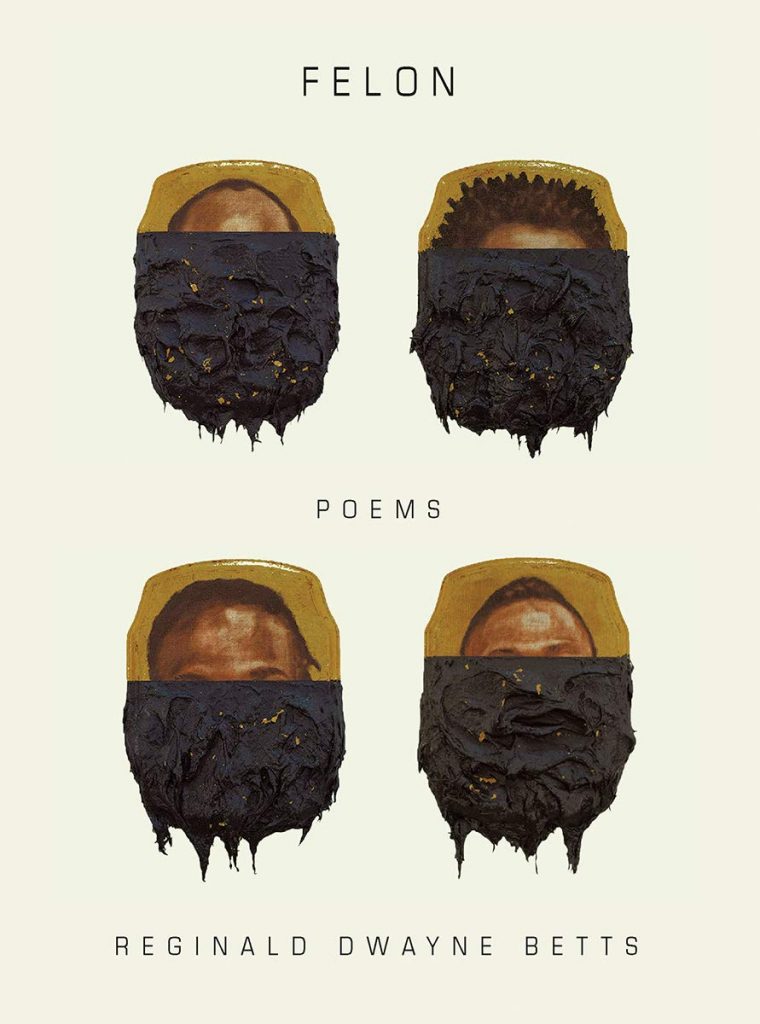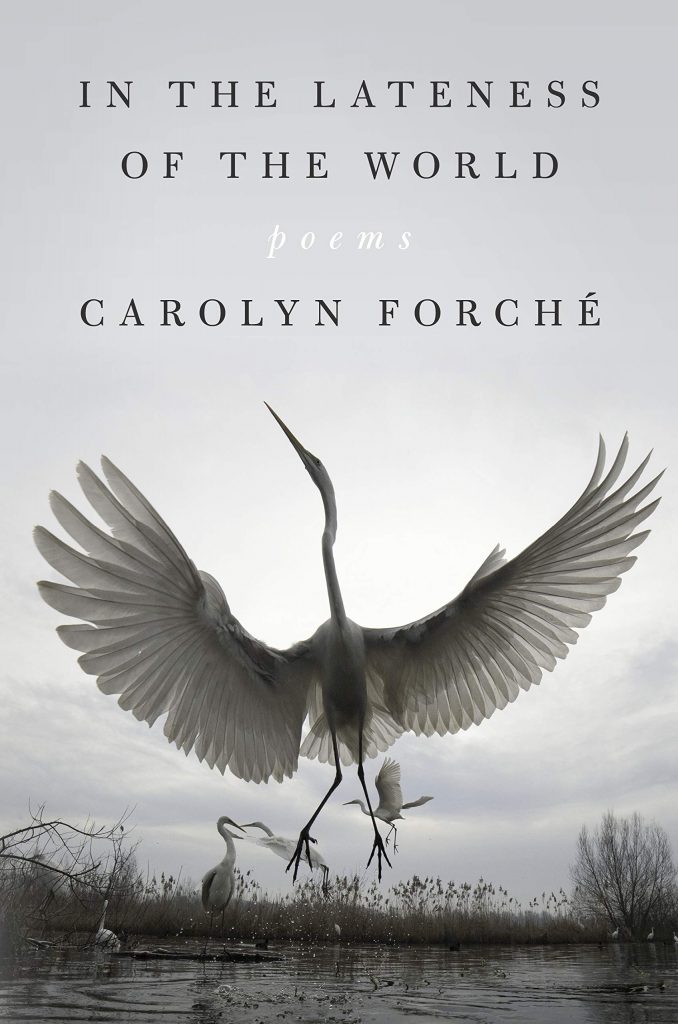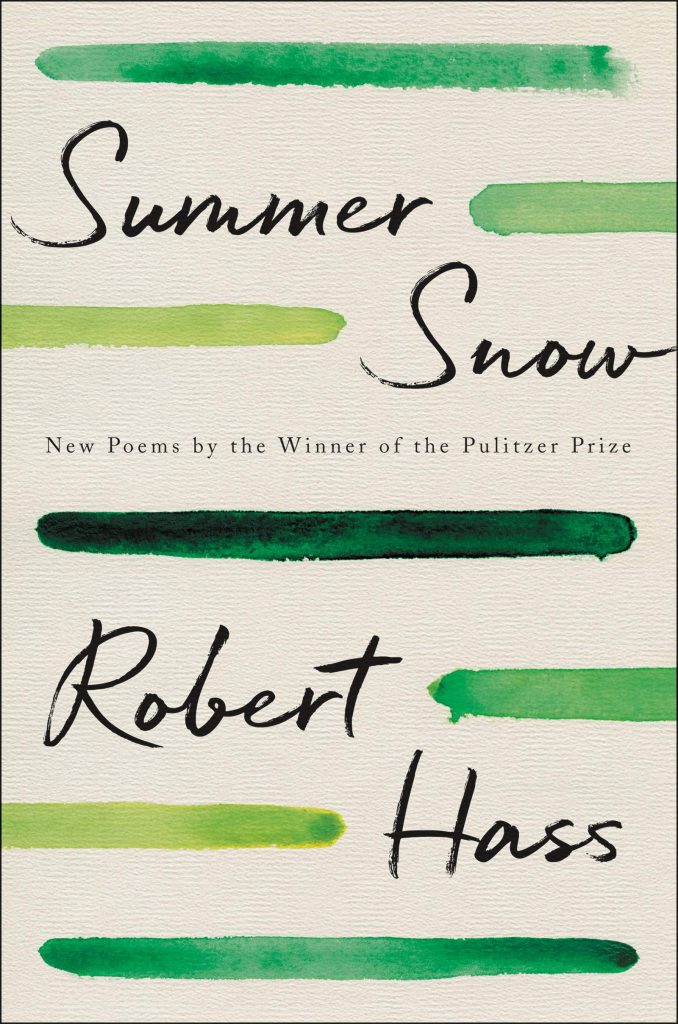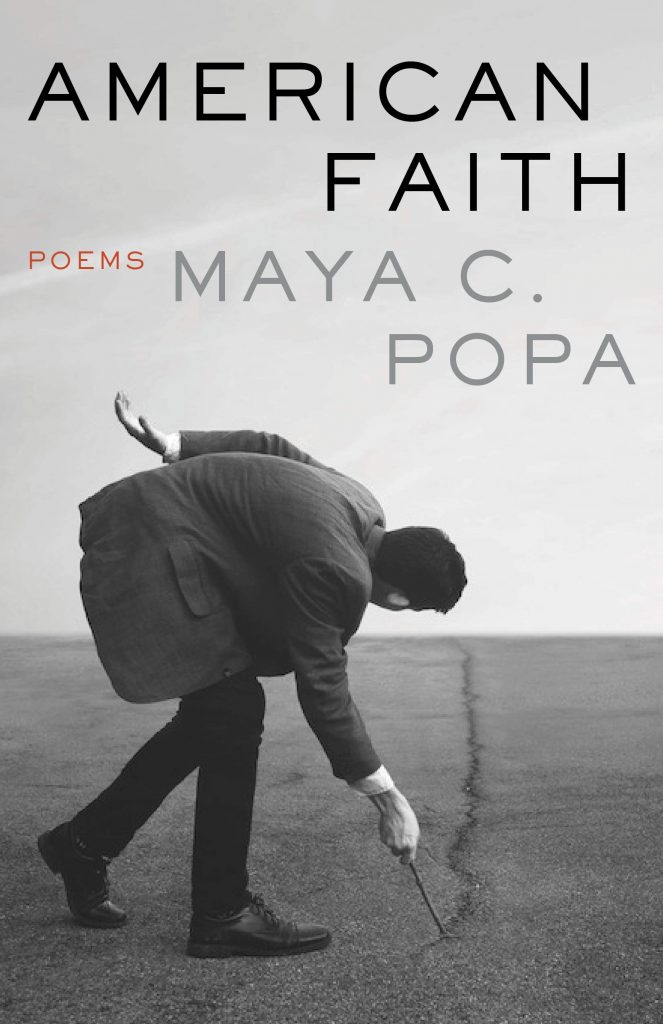



Summer Snow, by Robert Hass. Ecco, 192 pp., $16.99.
American Faith, by Maya C. Popa. Sarabande Books, 96 pp., $15.95.
In the Lateness of the World, by Carolyn Forché. Penguin Press, 96 pp. $24.
Felon, by Reginald Dwayne Betts. W.W. Norton & Co, 112 pp., $15.95.
“It was a failure of imagination,” says Donald Rumsfeld in Errol Morris’s documentary The Unknown Known, referring to the attacks the United States suffered at Pearl Harbor and on 9/11. I admit with deep unease a certain sympathy to such an idea. If only we had pressed our imaginations into more grandiose, more morbid territories, the thinking goes, perhaps we would have spared ourselves those piercing tragedies. Perhaps the imagination, if we had trusted it more, could’ve been—still can be—employed to save us. If only we could have imagined this year would proceed as it has …That’s the temptation, at least. However. I don’t believe the imagination can be instrumentalized so easily, or without perilous consequence. And I become concerned when attention on the present moment, especially in the wake of catastrophe, is so quickly and willingly displaced for the speculative future. It’s too easy, too defensive, too incurious a response, which is anathema to real insight. Inversely, it seems to me that a healthy imagination in the midst of loss—not to say a happy or content or comfortable one—could also be called grief. And, as my therapist once told me, her eyes as she said it forever fixed into my mind: “We only do harm when we don’t connect with our grief.”
I didn’t set out to write on the subject of Covid, even if only implicitly. But it is true that the past year has been filled with grieving, for those who have died and continue to suffer in the ongoing pandemic, for the future we had imagined that’s no longer possible. And as I look back on the months I’ve spent reading, wondering if I should be doing something more important, more dynamic than working on a review of books, it now seems obvious to me that there was something nourishing about the four books under review here: each in its own way deliberately makes a space for loss. I’m not saying that poetry healed or saved me, that these poems offer us any solutions. But I do believe that through their endeavor to articulate all the uncanny, unpredictable frustrations, fears, rages, sorrows, joys, and loves that comprise the poems, these poets provided me a way to connect with my own grief. Which is to say: they reminded me to live.
I
What I usually dislike in Robert Hass—what Michael Robbins called his “dewy pieties” in his now infamous review in Poetry—is not what I dislike about Summer Snow, his new collection. But about 163 pages into the 192-page book, I stopped worrying. That’s when I encountered “The Sixth Sheikh’s Sheep’s Sick,” which is just as silly as it sounds, using as it does a series of tongue twisters to organize itself, with little apparent aim other than “praise to the breath, and the lips, and the teeth,” bouncing with the unabated freedom of a child discovering the textures and tastes of new, mixed diction:
“Maybe,” the poet goes on to say, “it’s just playing.” (Like I said: nothing to worry about here.) Indeed, though Hass has gained a reputation as one of our most prominent poet-critics and translators in the past four decades, he’s always taken his poems just seriously enough—which is to say, not too seriously. We find little in these pages of the tedious pomposity and deliberate Greatness of, say, someone like his late friend Czeslaw Milosz; we instead find ourselves seated companionably across from the sagely yet often insouciant Hass, who’s good-humored and comfortable enough to make light of his own earlier writing.
The poem to which Hass alludes, “September, Inverness” from his 1996 collection Sun Under Wood, is a tight, eleven-line meditation propelled by a taut music—“This is the moment when bliss is what you glimpse / from the corner of your eye”—and tinctured with a quietly elegiac mood, as so much of Hass’s oeuvre is, oscillating compulsively between the poles of praise and lament. One finds the same, familiar temperament in Summer Snow, though the energies and intensities of the poems have diffused, often into easy-going imprecisions; off-hand qualifications like “I think” or “I guess” appear a few times more than a deliberate sprezzatura might allow. And where once Hass’s chatty, anecdotal tangents could more often than not reward the reader with sublime conclusions packaged in non-sequiturs, as in an earlier poem like “Faint Music,” we now find meandering efforts that end as randomly as they began (“Three Propositions About a Subject Still to be Determined,” “Los Angeles: An Analysis”). Where once the poems turned to and transmuted the natural world in order to flesh out some abstract philosophical idea, illustrating an idiosyncratic mind at work, we now find, in efforts like “Large Bouquet of Summer Flowers, or Allegory of the Imagination,” a man writing down his ideas into his notes, just as they come.
I don’t mean to be mean. And to be sure, one still finds a master at work in this book, especially when Hass can focus on a particular theme. In “Dancing,” for instance, a long, seemingly digressive history on the development of firearms accretes into a shocking, darkly tragic indictment of the unsettling mixture of playfulness and terror that Americans in particular feel toward guns:
There is distilled in that final word, “dancing,” both exuberance and sorrow, irony and moral seriousness, and the full span of human history. (As with so many people who appear in this book, the young men are most alive when you can feel Hass’s brain brushing them with thought.) And it’s moments like these in which Hass’s far-ranging, associative leaps feel less like a restless imagination doodling on the page than a patient imagination finally revealing its shape.
Of course, it’s likely such a shape wouldn’t have revealed itself without a lot of doodling. Perhaps the most demanding discipline to which a poet needs to remain faithful is play, a propensity for fucking around. “Lest ye be as little children,” one could say. And despite its frustrating unevenness, its odd editing choices, including how each new poem begins on a recto page, leaving over twenty verso pages blank, and the handful of notebook poems that really do feel like they were lifted straight from Hass’s journal, the main pleasure of this collection—the one that caused me, at last, to stop worrying—is just how assiduously it demonstrates Hass at work, keeping himself open to poetry. The access to an individual’s private interrogations, which at times can be boring, at times illuminating, at times surprising, at times casually prosaic, and at times zanily poetic: such are the genuine delights of peeking into an artist’s process. And such are the genuine delights of Summer Snow.
II
In America, especially after 9/11, the meaning of terror was amplified beyond mere fear, into a word that accumulated a nearly inescapable gravity, around which our increasingly complicated anxieties—social, political, economic—orbit. One could also easily add technology to the list of anxieties, considering how accessible and near at-hand the footage is, not only of the World Trade Center explosions, but any number of the graphic, pixelated tragedies trafficked on social media. Knowledge is indeed power; but, now twenty years into the twenty-first century, it’s undeniable that the infinite knowledge available to us in the Information Age is not without pervasive consequences.
Maya C. Popa’s debut collection of poetry, American Faith, published by Sarabande, sets out to explore and critique those consequences. Note for instance the second poem of the book, “The Government Has Been Cancelled,” where the central questions of the book—privacy, violence, and the ramifications of our engagement with information—come into focus as the speaker reflects on her friend dissecting a cadaver in medical school. In response to this discomfiting scenario, relief or at least distraction quickly arrives in the form of a zoo’s panda camera stream:
Obsessed as we are with real time updates and video streams, vigilance—i.e. the obliteration of privacy—looks an awful lot like superstition: should we turn our heads for one moment, should we shut off the stream, then the animals will go unfed. We will surely suffer the catastrophe that only our attention had been staving off. “I go home burdened and amplified by knowledge,” the speaker eventually concedes, “live in the world this information refers to—/ there is no better, other way to do this,” pointing to the paradox and problem of how experience is hopelessly flattened yet impossibly expanded by the internet. In answer, those “privacies / we must pretend are still intact,” begin to function as a structure for the imagination rather than as barriers, as the skin and skeleton provide structure and form to the body, “that cold, familiar otherness,” waiting for the speaker’s friend to “break them tenderly.”
That the poem’s tones are mixed is representative of the collection as a whole. In its sensibility, which Popa seems to have inherited from Robert Hass, American Faith vacillates between an irony that is at times acerbic (“Is This Your Bag Would You Please Open It”), intellectual (“Knockout Mouse Model”), or literary (“The Seer Dreams Antigone”), and a sentimentality that at times balances the typical headiness of the writing, as in “Scala Naturae,” and at others seems employed to generate unearned feeling. The book’s two longest poems are the most perplexing examples of this impulse, both taking as their occasion the untimely death of the same boy, the author’s childhood friend—or almost-friend, since the poems seem unclear on how to talk about the textures of the relationship. “No easy elegy for the one you didn’t / all things considered, work to befriend,” writes Popa in a moving note of self-recrimination in “Elegy,” at the same time addressing the strangeness of mourning, in poetry, the death of someone with whom she was not, admittedly, close. Yet in the final gesture of the poem, the register jolts into a confusing intimacy:
It’s a complicated business, I admit, how grief colors the imagination, which is in large part exactly what “Elegy” seeks to articulate. But the grandness of the rhetorical gestures made toward the young man serve only to obliterate the living trace of him in the poems, culminating with a mystifying attempt to connect his death with the September 11th attacks— “the events seemed / so cosmically similar” —in “Wittgenstein in the Palisades.”
And yet what I most admire about the book is its very intense desire for connection. Its anger and frustrations find their root in those blind spots and prejudices that separate us, its triumphs in that rare fusion of memory, insight, and language that leave us, if only momentarily, with the sense that we can know and be known by something beyond us. Popa is at her best when in conversation (and sometimes, conflict) not with ideas, but with those she cares for: a friend, her students, or, as in “A Technique for Operating on the Past,” my favorite poem in the collection, her family. “Like all the men in my family, he was a close reader and a musician,” she writes of her great-grandfather, a physician, who
There’s something disconcerting yet delicate in these lines, something alien yet irresistibly familiar in how the doctor’s clinical precision is not cleaved of all affect but is instead uncannily likened to an easy, immersive, yet fathomless swim into the depths of all human understanding. St. Paul in his second letter to the Corinthians finds great power in such ambivalence, moments filled at once with fear and majesty: “Knowing therefore the terror of the Lord,” he writes, “we persuade men; but we are made manifest to God; and I trust are made manifest in your consciences.” That terror, where we are not only made manifest to Reality, but to our own capacity for right action, could very well also be called wonder. And it’s in these moments of wonder where Popa’s talents are on fullest display, where vision is burnished, not blurred, by a clarity that cuts into and celebrates the days—those “impatient, fresh beasts” as Popa calls them—in which we must live.
III
Carolyn Forché is a poet who demands patience from her readers: her most recent collection, In the Lateness of the World, is her first in seventeen years; before that, the world endured nine years between The Angel of History and Blue Hour, a song’s length in comparison. And perhaps we should expect such roomy, deliberate silences from a writer whose attention is so attuned to world history and world poetry: to rush either would be an injustice to both.
Indeed, Forché never rushes. Even in the course of a routine walk in “Morning on the Island,” one feels the passage of decades, not minutes:
Moving through what amounts to a veritable conifer cemetery (“cemetery: a landscape of the past” —Anna Kamineska), the long, gradual decay of the landscape comes into focus with each line: the devoured trees; the vanished, warming winter that has exacerbated the beetle invasion. The subtext, of course, is climate change; the invisible antagonists, humans. And yet as the poem reaches its conclusion, humanity remains hauntingly offstage—or nearly so:
In an unsettling paradox, loss in this landscape functions as both exposure and erasure. The snow, along with winter, has disappeared. The lone owl, now alienated from the landscape it once invisibly blended into, has been made singularly apparent. In its last lonely question, we find little comfort: perhaps out of reverence or humility or the nagging sense that the overheard who is more indictment than invitation, the poet attempts no answer, but quietly observes. It is the owl here who deserves the final word.
“Morning on the Island,” like so many other poems in the collection and throughout Forché’s entire oeuvre, is an elegy of sorts. Forché’s poetry, in fact, has long been lauded for and occasionally reduced to its engagement with the elegy. Yet there exists in American poetry—and particularly in the poetry of American men—a certain knee-jerk, automatic irony toward the present moment, as though the old troubles through which we persisted imbued us with a certain strength or vitality that’s harder to come by these days. (Just think of Philip Levine’s missives set in working-class Detroit.) And though poetry of that sort could rightly be said to work in an elegiac mode with its attention transfixed on what has fallen away, its project so often feels like the construction and celebration or consciousness of a past that never existed, rather than a lament for what is gone. Perhaps this is one of the costs of empire: to feel as though our best days are always behind us—inaccessible and therefore eternal.
I recently stood rapt by the work of sculptor Ledelle Moe whose cement statues either reclined or kneeled in various states of disintegration, metal frames and unfinished surfaces apparent, the exteriors scarred either by age or deliberate violence. It was one of the most evocative reflections on artistic process I’ve encountered—that is, the kind of artistic process that incorporates into its very form dissolution and death. I can’t help but now think that the two projects, Moe’s and Forché’s, articulate the same austere truth: that absence is not merely an opening for the assertion of self. As much as we place in art our hope for our lives to be reconstituted, any form that does not make room for true loss is a dead art. And in poem after poem from In the Lateness of the World, like “The Boatman,” “The Last Puppet,” and “The Refuge of Art,” our losses are not restored but shown for what they are. By means of a patient but not jaded irony, our vision is made whole:
IV
“Redaction,” writes Reginald Dwayne Betts in the stunning ghazal that opens Felon, “is a dialect after prison,” a fitting introduction to what follows. The aftermath of prison, those silences and elisions that haunt everyone the system touches, is at the center of Betts’s third full collection. Moving with an avidity, a peripatetic fluency, Betts’s language threatens to overrun even as it invigorates the very shape of the poems, as in “Parking Lot, Too”:
As the anaphora accrues a sonic and imagistic momentum propelling the lines forward, there’s also an insidious, exhausting, deliberate monotony. Revisiting history is taxing, especially when searching for discrepancies, lies, or evidence of a crime, as in a police interrogation. So it seems to me a profound and surprising triumph that instead of being divested of any attachment to the unraveling narrative, the speaker ultimately owns his story, which is stitched into the fabric of the country:
Perhaps at no other time in our country has the blurring effect of too much language been more evident than now. (One thinks of Steve Bannon’s notoriously simple media strategy, now description rather than prescription, to “flood the zone with shit.”) Poetry, we’d like to believe, as a model of clarity through compression could act as an antidote of sorts in such a milieu. But few poets in recent memory have so directly explored what that poetry might look like. The book’s four redaction poems in particular, each taking as their source text legal documents filed on behalf of people incarcerated because they could not afford to pay bail, stand as powerful and startling examples of how words can both erase and disclose the human:
It’s an odd, unnerving jolt to read “the plaintiffs” redefined simply, and truly, as “people,” as “a human,” as “the person” who is kept in jail. That we needed both the reminder and clarification that the referents in court documents are people, not mere historical or legal abstractions, is both indictment and lament written in the very language of the legal system, in its very documents. Yet in Felon, such a critique is revealed—and could only be revealed—by the poet.
However, what I find most compelling about this collection is not redaction itself or the revelations that follow but the questions snaking through all its pages: what is the function of erasure? Why, in its various forms, do we use it? The four “Essay on Reentry” poems, to me the most affecting in the book, document the poet’s own attempts at narrating the years that prison blacks out, like the late night drunken confession he makes to his son about “the years spent inside a box,” those years that after prison no longer belong even to memory:
What we’re left with is not some cover-up but a kind of forgetting, which is perhaps the greatest challenge to a full, honest accounting of our history. Betts has written a difficult book which does not seek to solace or console, and which provides few answers: memory is not salvation, nor is erasure complete oblivion. Yet there remains in Felon a clear sense that both processes, redaction and remembrance, can be used in ways that do justice to history, or do harm. That we can seek the truth, or seek to hide it. When a person strives with such intensity to put the shards of language they’ve with great effort salvaged from memory in the service of truth, as Betts does in these pages, what they make is poetry.
Christian Detisch’s poems, essays, and criticism appear in 32 Poems, Image, Blackbird, Unsplendid, and elsewhere. He received his MFA in poetry from Virginia Commonwealth University and his M.Div from the Institute of Sacred Music at Yale Divinity School.
